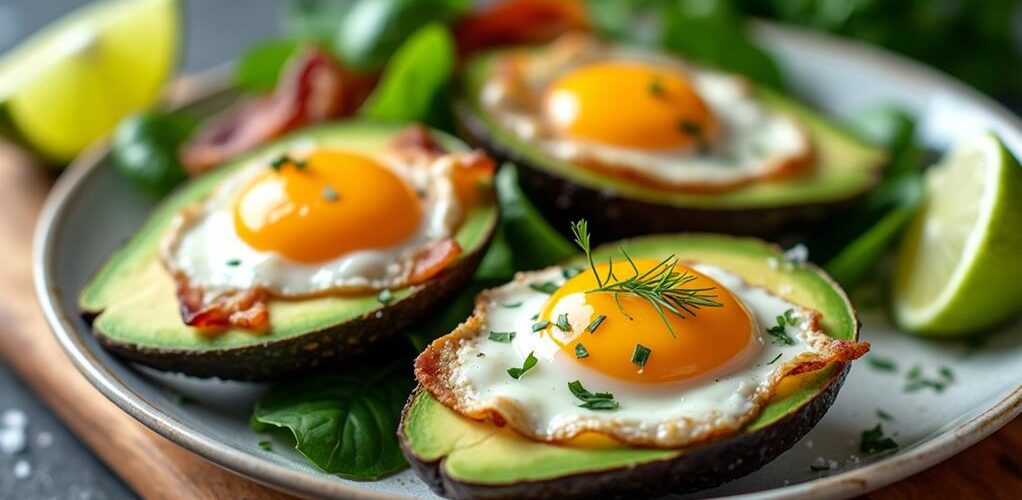
To effectively adhere to a keto diet, prioritize these ten essential foods: nutrient-rich seafood for omega-3s, various cuts of meat and poultry for zero carbs, and versatile eggs for high protein. Incorporate cheeses and low-carb vegetables like cauliflower and bell peppers for flavor and nutrients. Healthy fats, such as olive, coconut oils, and butter, are crucial for energy. Opt for plant-based milks, such as unsweetened almond milk, to avoid extra carbs. Nuts, seeds, and low-carb berries round off the list, providing essential nutrients and antioxidants. By incorporating these foods, you can maintain ketosis and optimize overall health.
Key Takeaways
- Seafood: Essential for omega-3s and protein, with carb-free options like shrimp and fatty fish like salmon.
- Meat and Poultry: Fresh, carb-free options like grass-fed beef and chicken thighs, rich in protein and healthy fats.
- Eggs: Versatile and nutrient-dense, with less than 1g of carbs per egg, providing high-quality protein.
- Cheese: Low-carb varieties like cheddar and mozzarella, high in fat and calcium, perfect for keto.
- Healthy Fats: Include olive oil, coconut oil, and butter to enhance flavor and support ketosis.
Seafood
When it comes to the keto diet, seafood stands out as a highly recommended option due to its rich nutrient profile and compatibility with the diet's macronutrient requirements.
Particularly, fatty fish like salmon, mackerel, and tuna are excellent choices as they are rich in omega-3 fatty acids. These essential fats not only improve insulin sensitivity but are also beneficial for overall heart health. For example, a 100g serving of salmon provides approximately 26g of protein and 11.8g of fat, with zero carbohydrates, making it ideal for maintaining ketosis.
Additionally, seafood consumption may have anti-inflammatory properties, further contributing to its cardiovascular benefits.
Seafood varieties such as shellfish, including shrimp and crabs, add to the diversity of the keto diet as they are carb-free. Even though oysters and octopus contain some carbohydrates, their nutrient density makes them valuable additions.
The American Heart Association recommends consuming 8-10 ounces of seafood weekly, aligning perfectly with keto guidelines.
Various cooking methods enhance the versatility of seafood in keto meal planning. Grilling, baking, or pan-searing are all suitable techniques that preserve the nutritional integrity of the fish.
Regular consumption of seafood also contributes to improved brain health, underscoring its importance as a nutrient-dense food source on the keto diet.
Meat and Poultry
Seafood offers a plethora of benefits for those adhering to a keto diet, but equally important are meat and poultry, which serve as foundational protein sources. Fresh meat and poultry are entirely carb-free, making them ideal for maintaining ketosis. Chicken, for instance, provides approximately 29 grams of protein and 3 grams of fat per 100 grams, serving as an excellent protein source.
When considering meat selection, grass-fed beef is highly recommended due to its higher omega-3 fatty acid content and the presence of conjugated linoleic acid (CLA), which may support fat loss. Skin-on poultry, like chicken thighs, offers more fat and flavor, aligning well with keto macronutrient goals. Lean meats such as turkey and pork can be included in moderation; however, higher-fat cuts are preferable for better adherence to the high-fat requirements of a keto diet.
Including a variety of meats, from lamb to organ meats, guarantees a thorough intake of essential nutrients and minerals, supporting overall health in a low-carb eating plan. Below is a table highlighting key aspects of meat and poultry for a keto diet:
| Meat Type | Protein (per 100g) | Fat (per 100g) |
|---|---|---|
| Chicken Breast | 29g | 3g |
| Grass-Fed Beef | 26g | 20g |
| Chicken Thighs | 24g | 9g |
| Pork Shoulder | 21g | 15g |
| Lamb Chops | 25g | 21g |
This varied meat selection, paired with thoughtful poultry preparation, will keep your keto diet both nutritious and enjoyable.
Eggs
Eggs are an essential component of the keto diet, providing less than 1 gram of carbohydrates and approximately 6 grams of protein per large egg, which helps maintain satiety and manage hunger.
The ketogenic diet promotes weight loss by utilizing fat for energy through a process called ketosis, leading to rapid fat loss.
The nutritional benefits extend beyond macronutrients, as egg yolks are rich in antioxidants like lutein and zeaxanthin, supporting eye health.
Additionally, their versatility in cooking makes them suitable for a variety of meals, from breakfast to dinner, ensuring they can be easily incorporated into daily meal planning.
Nutritional Benefits
Incorporating nutrient-dense foods into a keto diet is essential for maintaining health and achieving dietary goals, and eggs are a prime candidate for such a role. Eggs offer robust nutritional benefits, chiefly due to their high protein content and minimal carbohydrate presence. A large egg delivers approximately 6 grams of protein while containing less than 1 gram of carbohydrates, making it an ideal choice for those adhering to a ketogenic lifestyle.
Additionally, egg nutrition is noted for its excellent protein absorption properties, ensuring that the body efficiently utilizes the protein provided. Each 100 grams of whole eggs consists of roughly 14.1 grams of protein and 9.6 grams of fat, contributing to their status as a nutrient-dense food.
The yolks are particularly beneficial, loaded with antioxidants such as lutein and zeaxanthin, which support eye health. Despite containing high levels of cholesterol, research has indicated that the consumption of whole eggs does not correlate with an increased risk of heart disease for the majority of individuals.
Versatile Cooking Options
When considering the versatility of eggs in culinary applications, their adaptability becomes immediately apparent. Eggs are a cornerstone of keto diets due to their high protein content, approximately 6 grams per large egg, and minimal carbohydrate presence. The combination of protein, healthy fats, and essential nutrients makes eggs an indispensable component of low-carb eating plans.
Eggs can be prepared using numerous cooking techniques, allowing for a wide range of egg dishes that can keep meal planning both exciting and nutritious. Whether boiled, poached, scrambled, or made into omelets and frittatas, eggs offer endless possibilities for keto-friendly meals.
| Cooking Technique | Example Dish | Benefits |
|---|---|---|
| Boiling | Hard-Boiled Eggs | Quick snack, meal prep |
| Poaching | Poached Eggs | Low fat, elegant presentation |
| Scrambling | Scrambled Eggs | Easy, fast, customizable |
| Baking | Frittata | Great for batch cooking |
Incorporating eggs into salads or using them as the main ingredient in an egg-based dish provides a satisfying, nutrient-rich meal. Each yolk is rich in antioxidants, supporting eye health, and contributes to the high-fat intake necessary for maintaining ketosis. Their exceptional versatility guarantees you never run out of delicious and convenient options, making eggs a staple in any keto diet.
Satiety and Fullness
A key factor for the success of a ketogenic diet is the ability to maintain satiety, and few foods achieve this as effectively as eggs. Each large egg contains less than 1 gram of carbohydrates and approximately 6 grams of protein, making it an ideal nutrient-dense option for keto dieters. The high protein content in eggs is instrumental in promoting feelings of fullness and satiety, which can help reduce overall calorie intake. This makes eggs one of the most effective protein sources for managing hungry cravings.
Beyond their macronutrient profile, eggs are rich in antioxidants like lutein and zeaxanthin found in the yolk. These antioxidants are beneficial for eye health and further contribute to the nutrient density of this versatile food.
Consuming whole eggs can greatly enhance feelings of fullness, which can lead to fewer hungry cravings between meals. Research supports that including eggs in your meals can increase satiety levels, making them an effective choice for weight management on a ketogenic diet.
For those looking to sustain their keto lifestyle with practical and evidence-based choices, incorporating eggs into their diet is a strategic and healthful decision.
Cheese
Cheese is an excellent addition to a keto diet due to its high fat and low carbohydrate content, with options like cheddar containing just 1 gram of carbs per ounce.
Hard cheeses such as Parmesan and aged Gouda are particularly keto-friendly, while soft cheeses like cream cheese and goat cheese also fit well within dietary guidelines.
Besides enhancing flavor and texture in meals, cheese offers health benefits including muscle maintenance, bone health, and potential heart disease protection.
Low-Carb Cheese Options
For individuals adhering to a keto diet, selecting the right low-carb cheese options can greatly enhance meal planning and nutritional intake. Most cheese varieties, such as cheddar, mozzarella, and feta, are inherently low in carbohydrates, making them ideal choices.
For example, cheddar cheese contains only 1 gram of carbs per ounce, allowing dieters to enjoy its rich flavor without compromising their carb limits. High-fat cheeses like mozzarella and feta not only provide a robust taste but also align well with keto guidelines due to their minimal carbohydrate content.
Additionally, blue cheese and goat cheese are popular among keto dieters for their nutrient density, offering valuable calcium and protein. These cheese varieties can be paired with low-carb vegetables or used to enrich keto-friendly recipes, enhancing both taste and nutritional value.
When selecting cheese, it is essential to opt for full-fat versions and meticulously read labels to avoid added sugars and fillers that could increase carbohydrate content.
Regular consumption of these low-carb cheese options can support heart health and help mitigate muscle mass loss in older adults, making them a practical and beneficial component of a keto diet.
Health Benefits Overview**
The nutritional profile of cheese renders it a powerful ally in the keto diet arsenal, offering numerous health benefits beyond mere carb management. Low in carbohydrates, cheese varieties such as cheddar contain only 1 gram of carbohydrates per ounce, making them ideal for maintaining ketosis. Additionally, cheese is high in fat, with approximately 34.9 grams of fat per 100 grams of cheddar, aligning well with the increased fat intake required on a keto diet.
Regular consumption of cheese may also provide cardioprotective benefits. It is rich in calcium and protein, essential nutrients that support heart health, bone density, and muscle maintenance. Cheese also contributes valuable nutrients like vitamin B12 and phosphorus, further bolstering bone health and facilitating effective muscle function.
Moreover, incorporating different cheese varieties into meals can promote feelings of fullness and satiety, aiding in appetite control—a vital factor for sustained adherence to a low-carb diet.
For practical application, consider strategic cheese pairing; combining cheese with low-carb vegetables or nuts can enhance both flavor and nutritional value. Consequently, cheese serves not only as a delicious keto-friendly food but also as a multifaceted contributor to overall health.
Cream and Half-and-Half
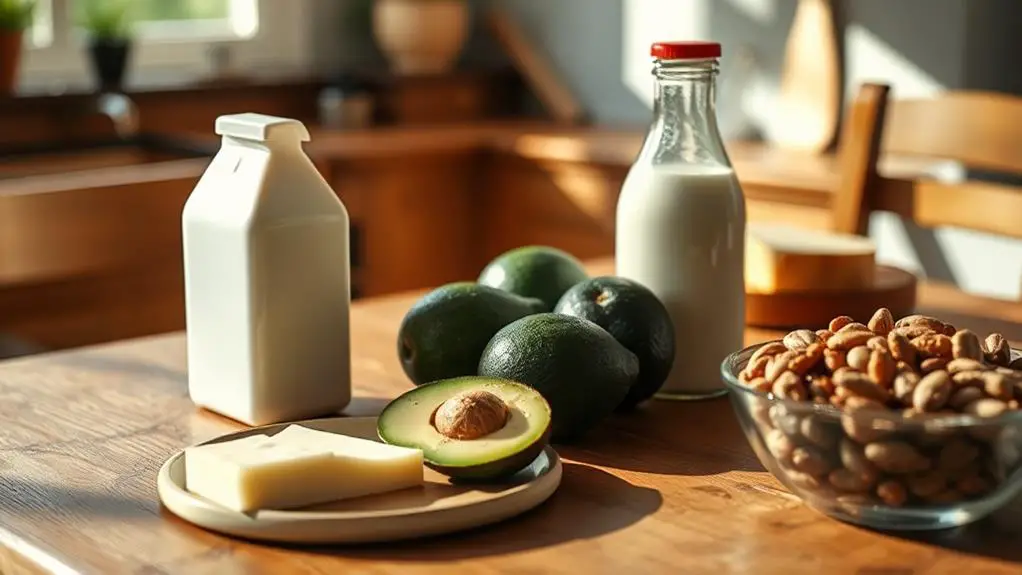
Ever wonder how to add richness to your keto diet without piling on the carbs? Cream and half-and-half are excellent choices.
Cream varieties, particularly heavy cream, contain 36-40% fat and less than 1 gram of carbohydrates per tablespoon, making them perfect for low-carb, high-fat keto requirements. Half-and-half, a blend of 50% cream and 50% whole milk, offers around 10-12% fat and 1-2 grams of carbohydrates per tablespoon.
Both cream and half-and-half are rich in conjugated linoleic acid (CLA), a fatty acid known for its potential to aid in fat loss and support overall health.
While they are beneficial for a keto diet, moderation is essential due to their saturated fat content, which can greatly contribute to overall calorie intake.
These dairy products can be seamlessly integrated into various half-and-half recipes to enhance flavor and texture while maintaining low carb counts.
For example, adding a splash to your morning coffee or using them to create creamy sauces can improve your dishes.
Plant-Based Milks
While cream and half-and-half provide excellent options for adding richness to a keto diet, those seeking plant-based alternatives have several keto-friendly choices. Unsweetened almond, soy, and coconut milk are prime examples of low-carb options that align well with ketogenic principles.
Unsweetened almond milk is particularly popular among keto dieters due to its low carbohydrate content, typically around 1 gram per cup. This makes it an excellent choice for those looking to minimize carb intake while enjoying a versatile milk alternative.
Soy milk, when unsweetened, contains approximately 3 grams of carbs per cup. It also provides a valuable protein source, making it a robust option for those who require additional protein in their diet.
Coconut milk, especially the canned variety, stands out for its higher fat content and low carbohydrate profile, with roughly 6 grams of carbs per cup. It is particularly suitable for creamy recipes and adds a rich texture to various dishes.
When selecting plant-based alternatives, it is essential to check labels for added sugars, as sweetened varieties can contain excessive carbs. Opting for unsweetened versions guarantees that these milk comparisons remain in line with a keto-friendly diet.
Low-Carb Vegetables
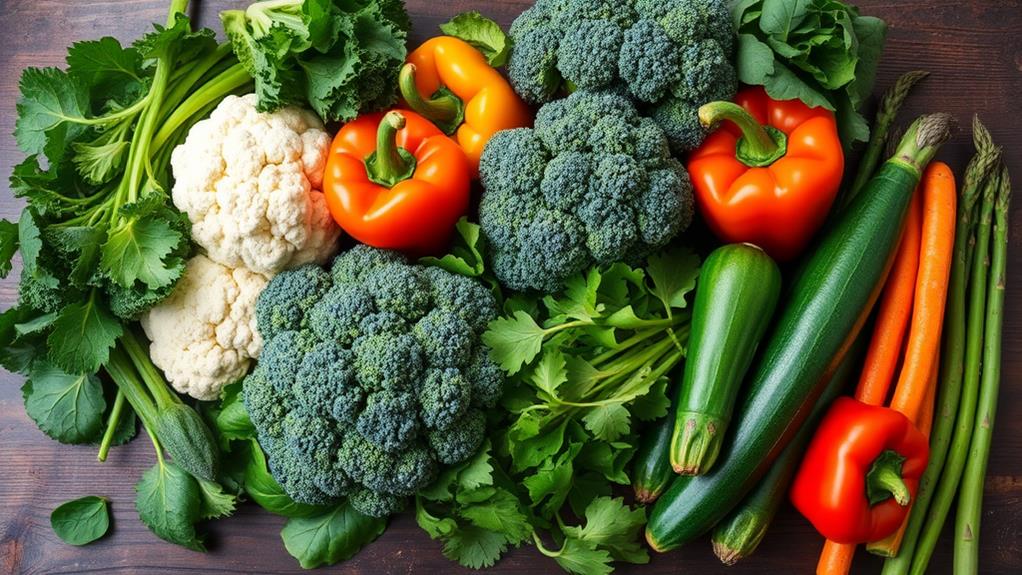
Low-carb vegetables are crucial in a keto diet, offering essential nutrients with minimal carbohydrate content. These nutrient-rich vegetables not only help maintain ketosis but also add flavor, texture, and variety to your meals. Common choices include leafy greens like spinach and kale, as well as cruciferous vegetables such as broccoli and cauliflower. Non-starchy vegetables generally contain fewer than 5 grams of net carbs per serving, making them perfect for keto recipes.
Cauliflower stands out for its versatility, substituting effortlessly for rice or mashed potatoes with only about 2 grams of net carbs per 100 grams. Zucchini and bell peppers are also excellent choices; zucchini has approximately 3 grams of net carbs per 100 grams, while bell peppers contain about 6 grams. Including an array of these vegetables in your meals delivers essential vitamins, minerals, and antioxidants without exceeding your carbohydrate limits.
Here's a quick reference table for some low-carb vegetables:
| Vegetable | Net Carbs (per 100g) | Keto Recipe Ideas |
|---|---|---|
| Cauliflower | 2g | Rice, mashed potatoes |
| Zucchini | 3g | Zoodles, grilled slices |
| Bell Peppers | 6g | Stir-fries, stuffed peppers |
| Spinach | <1g | Salads, smoothies |
| Kale | 3g | Chips, sautéed dishes |
Incorporating these vegetables into your keto meal plan guarantees you enjoy nutritious, low-carb options that enhance your diet.
Healthy Fats
Healthy fats are essential in a keto diet, with options like olive oil, coconut oil, butter, and ghee providing diverse benefits such as heart health, anti-inflammatory properties, and quick energy sources.
Incorporating these fats daily not only helps maintain ketosis but also enhances the flavor and nutritional profile of meals.
Practical choices include using olive oil for salads, coconut oil for cooking, and butter or ghee for adding richness to various dishes.
Types of Healthy Fats
Why are healthy fats essential on a keto diet? Healthy fats serve as the primary energy source, helping to maintain ketosis and promoting efficient fat burning. Selecting the right fat sources and employing proper cooking methods are vital for optimizing your keto journey.
Olive oil is an excellent fat source, rich in monounsaturated fats and oleic acid. It is also beneficial for heart health and contains polyphenol antioxidants that reduce inflammation.
Olive oil can be used for sautéing vegetables or as a dressing for salads, making it a versatile addition to your kitchen.
Coconut oil, composed mainly of medium-chain triglycerides (MCTs), offers another valuable fat source. These MCTs can quickly increase ketone levels, providing rapid energy.
Coconut oil is ideal for high-heat cooking methods like frying or baking due to its stable composition.
Butter, with 82.2g of fat per 100g, is low in carbohydrates and high in flavor, making it perfect for keto recipes.
It enhances the taste of dishes while providing substantial energy.
Ghee, a carb-free clarified butter, offers a concentrated flavor suitable for various cooking methods, including roasting and frying.
Its high-fat content supports fat loss, making it a staple in keto kitchens.
Benefits of Healthy Fats
Incorporating healthy fats into a ketogenic diet offers numerous benefits, which extend beyond merely providing an efficient energy source. Healthy fats such as olive oil and coconut oil are essential in supporting heart health and improving insulin sensitivity due to their rich content of monounsaturated and saturated fats, respectively.
These fats play a vital role in enhancing fat metabolism, facilitating a more efficient breakdown and usage of stored fat.
Avocados, a staple in many keto diets, are a prime source of healthy fats, offering approximately 15 grams per fruit along with 10 grams of fiber. This combination promotes satiety and supports digestive health, reducing the likelihood of overeating.
Additionally, butter and cream, both low in carbohydrates, contain conjugated linoleic acid (CLA), which has been associated with fat loss and improved metabolic health.
Consumption of healthy fats also stimulates the production of ketones, which the brain can use as an alternative energy source, potentially leading to enhanced cognitive benefits and improved mental clarity.
Incorporating Fats Daily**
When following a ketogenic diet, integrating healthy fats into daily meals is paramount for maintaining ketosis and optimizing health outcomes. Healthy fats, such as those found in olive oil, coconut oil, and avocados, play a critical role by providing the primary energy source while promoting ketosis and fat burning.
For effective fat portioning, consider that a tablespoon of olive oil contains approximately 14 grams of fat, primarily monounsaturated, which supports heart health and reduces inflammation.
Coconut oil, composed of about 100% fat, mainly medium-chain triglycerides (MCTs), is another excellent choice. MCTs can increase ketone production and serve as a quick energy source for the brain, making it a valuable addition to your daily intake.
Avocados, providing around 15 grams of healthy fats per fruit along with fiber and potassium, aid in electrolyte balance and promote satiety, ensuring you stay full longer.
Additionally, incorporating butter and cream into your meals can enhance flavors while maintaining a high fat intake. For instance, 100 grams of butter contains 82.2 grams of fat and only 0.6 grams of carbohydrates, making it an ideal choice for keto-friendly cooking.
Proper fat portioning and varied daily intake of these sources can help sustain a successful ketogenic diet.
Nuts and Seeds
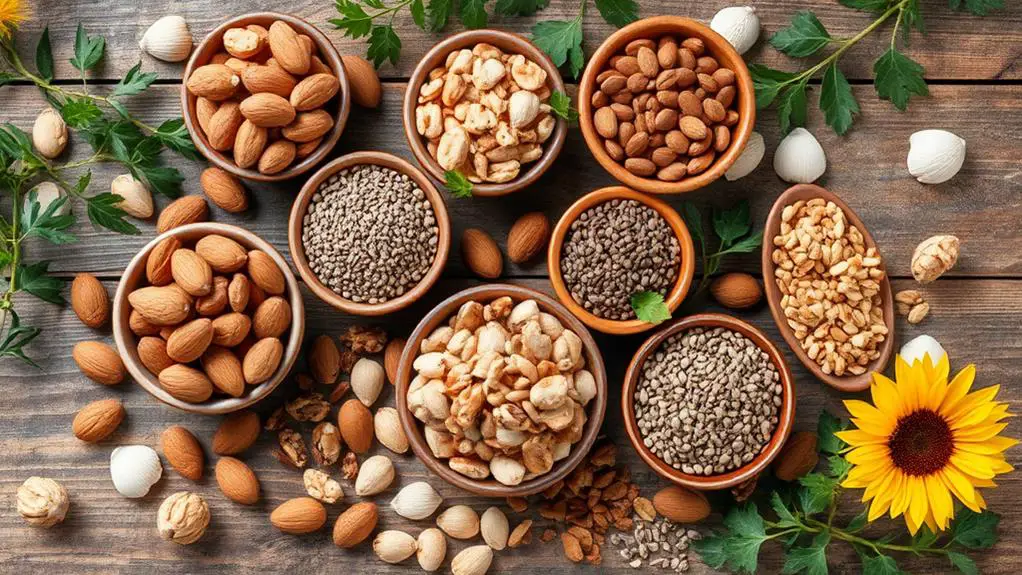
Nuts and seeds stand out as a cornerstone of the keto diet due to their low carbohydrate content and high levels of healthy fats and proteins. These nutrient-dense foods not only contribute to satiety but also offer a range of essential vitamins and minerals.
For example, 100 grams of almonds provide 16.7 grams of fat, 8.7 grams of protein, and just 2.1 grams of carbohydrates, making them a perfect addition to keto meal plans.
Nut varieties such as walnuts and macadamia nuts are particularly beneficial, offering significant amounts of vitamin E and magnesium. Similarly, the seed benefits are notable; chia seeds, for instance, deliver around 34 grams of fiber per 100-gram serving, promoting digestive health and fullness.
To maximize the benefits of nuts and seeds on a keto diet, consider the following:
- Opt for variety: Incorporate a range of nuts and seeds like pumpkin seeds and flaxseeds to diversify your nutrient intake.
- Mind portion sizes: Stick to a serving size of about 1 ounce (28 grams) to manage calorie intake.
- Check for added ingredients: Choose raw or minimally processed options to avoid unwanted carbs and sugars.
- Store properly: Keep nuts and seeds in airtight containers to maintain freshness and nutritional value.
Berries
After discussing the numerous benefits of nuts and seeds, another group of foods that can be effectively integrated into a keto diet is berries. Certain berry varieties, such as strawberries and raspberries, are particularly suitable due to their lower carbohydrate content. For instance, raspberries contain approximately 5.4 grams of net carbs per 100 grams, while strawberries have about 7.7 grams of net carbs per 100 grams. This allows for moderate consumption without exceeding daily carb limits.
Berries are also rich in antioxidants like vitamin C and dietary fiber, supporting overall health and digestive function. Incorporating berries into keto recipes can provide natural sweetness and help satisfy cravings. For example, adding berries to smoothies or yogurt bowls can offer a flavorful alternative to high-carb snacks and desserts.
Below is a comparison of some common berry varieties and their net carb content:
| Berry Type | Net Carbs (per 100g) |
|---|---|
| Raspberries | 5.4 grams |
| Strawberries | 7.7 grams |
| Blackberries | 4.3 grams |
| Blueberries | 12.1 grams |
| Cranberries | 7.6 grams |
Frequently Asked Questions
What Foods to Stock up on for Keto?
When considering keto pantry essentials, stock up on fresh meats, fatty fish, high-fat dairy, low-carb vegetables, and healthy fats. Additionally, include low carb snacks such as nuts and seeds to maintain energy levels and nutrient intake.
What Are the Top 10 Keto Foods?
Top 10 keto foods include fatty fish, meat, poultry, low-carb vegetables, high-fat dairy, healthy oils, nuts, seeds, avocados, and eggs. These options support keto snacks and keto meal prep, ensuring balanced nutrition.
What Foods Can You Eat All You Want on Keto?
On a keto diet, you can consume non-starchy vegetables, high-fat dairy products, fatty fish, and nuts and seeds freely. For keto snacks and low carb desserts, opt for cheese, nuts, and sugar-free chocolate.
What Is the Most Filling Food on Keto?
The most filling food on keto, considering keto satiety factors and high fat options, is eggs. They offer a balance of protein and minimal carbs, promoting fullness efficiently. Fatty fish and avocados also greatly enhance satiety.
Conclusion
The keto diet necessitates a strategic selection of foods to maintain ketosis and promote overall health. Key items include seafood, meat, poultry, eggs, cheese, cream, low-carb vegetables, healthy fats, nuts, seeds, and limited berries. These foods provide essential nutrients while minimizing carbohydrate intake. Incorporating these items supports metabolic processes, aids in weight management, and guarantees nutritional balance. Emphasizing these essential foods can facilitate adherence to the keto diet and optimize its benefits.
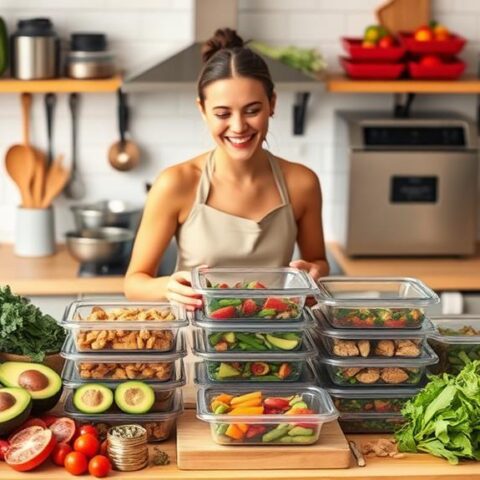




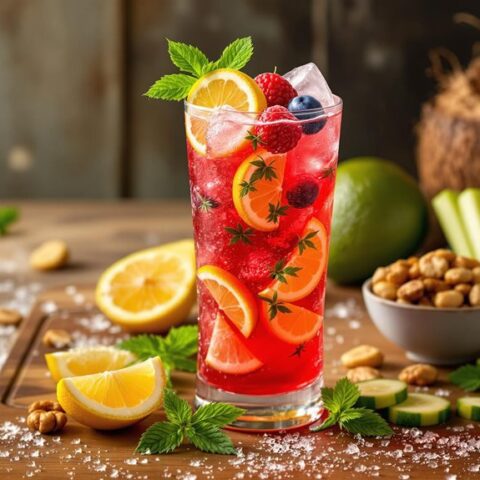




No Comments